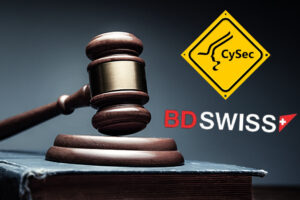CySEC wants to limit the leverage to 1:20… and to 1:50
Cypriot financial supervision, CySEC, announced the start of a public consultation. The subject of the talks is to be the idea of introducing product restrictions on the Forex market, similar to those that apply "temporarily" due to ESMA regulation. However, there would be some significant differences.
1 leverage: 20, cryptocurrencies banned?
In a significant part, CySEC's ideas are just a duplication of ESMA's rules. One could go to the head and ask: "Why introduce anything?" Well, ESMA is only entitled to temporary product intervention, which in theory can be extended indefinitely, but in practice it is not a very convenient solution. Looking long-term, the natural activity seems to be to convince national regulators to take matters into their own hands and to develop their own regulations, which will only be accepted by ESMA. Such a step has already been decided by Great Britain, Germany, France, or Poland (the final shape of the regulations is still underway).
CySEC went out with his own ideas that would introduce the introduction "Extended" categorizing clients to three (or actually four) groups, such as:
- negative - people who do not have adequate knowledge to invest in the FX / CFD market,
- Positive - people with appropriate knowledge of the market and investments,
- positive + - more advanced people (no details),
- Grey - people who do not fit into any of the above groups.
W CySEC press release we read:
"When determining the appropriateness of products from the CFD sector, the broker will have to apply classification to each retail client within a specific target market between" positive "and" negative "and" gray "(customers who do not match any of the first two groups). Customers from the last group may be exposed and vulnerable to the risk of too high leverage that exceeds their knowledge, financial position and risk appetite. "
In the case of status "Gray" trade restrictions should be expected an even greater limitation of the leverage than is apparent from the ESMA regulation. However, in the case of a group "Positive +" one could get liberal treatment and better conditions than ESMA allows so far. People who would receive status "negative" they could not invest in the Forex / CFD / cryptocurrency market.
The Cypriot regulator comments:
"CySEC proposes to implement a ban on the marketing, distribution and sale of CFD leveraged on cryptographic assets to retail customers, unless they are in the top row of a positive target market to prevent exposure to excessive risk caused by extreme volatility of instruments" .
| Gray | Positive | positive + | ESMA regulations | |
| Main currency pairs | 20:1 | 30:1 | 50:1 | 30:1 |
| Other currency pairs, indices | 10:1 | 20:1 | 30:1 | 20:1 |
| Commodities | 5:1 | 10:1 | 20:1 | 10:1 |
| Projects | 2:1 | 5:1 | 10:1 | 5:1 |
| Cryptocurrencies | 1:1 | 1:1 | 2:1 | 2:1 |
At this stage, CySEC does not define how the knowledge and experience of traders would be verified and what factors would be taken into account. It is not known what would happen with the status "Professional client"which is currently the only European pass to use leverage even 1: 500.
Looking, however, that Cyprus is all the time "The basin of Forex" in Europe, the regulator will certainly want these conditions to be liberal as compared to the rest of the countries of the community.
CySEC is waiting for feedback to 14 in June
Public consultations are open until the end of the second week of June this year. All opinions referring to product intervention proposals can be sent by e-mail to the following address: policy@cysec.gov.cy.
 Demetra Kalogerou, chairwoman of CySEC, comments:
Demetra Kalogerou, chairwoman of CySEC, comments:
"As this guidance has been transposed into law along with the additional national measures and restrictions set up by CySEC, our consultations with investors and the industry will provide an opportunity to get feedback on what we consider as the basic new commitment principles. While consumer demand for high-risk products, speculative trading products do not show signs of decline in Europe, Cypriot investment companies must continue to reform their business models to ensure adequate investor protection. "
Is it good idea?
Admittedly, the idea has its logical justification and can be assessed positively. In the case when a completely inexperienced person goes to the Forex / CFD market, no leverage is indicated for it. Unfortunately, mainly such people are responsible for negative Forex market statistics and identifying trading with the chance of fast capital loss.
There are still many unknowns at this stage, including in determining the categorization of clients. Status provides an opportunity to "improve" the possibilities of trading in the FX market positive +but everything will depend on details. Finally, the status professional customer all the time it is possible to achieve, but exceptionally exuberant conditions mean that only a few can use it in practice.
You can, however, argue about the amount of leverage. Is 1: 30 really a reasonable maximum for people who know a lot about the market? Is 1: 50 enough to not give more traders status "Old stager"? The chances that ESMA will allow any regulator in the future to introduce the 1 leverage: 100 is rather small. At least in the next few years.
Subcategory of an experienced customer in Poland
The decision of CySEC is commented on by the Polish Chamber of Brokerage Houses, which draws attention to similar plans in the creation of a new categorization position in the shape of Positive +. Could it be enough to protect the domestic Forex / CFD market against a further outflow of customers and a drop in turnover? Below we publish the full IDM commentary.
Marek Wołos, expert of the Chamber of Brokerage Houses for OTC markets:
“Since December 2018, the Chamber of Brokerage Houses together with the Department of Investment Firms of the Polish Financial Supervision Authority have also been carrying out work related to the calibration of the national intervention. During the consultations, several solutions important for the further development of the market were developed, such as e.g. creating a subcategory of an experienced client. In the assumptions analyzed by the Chamber and the PFSA, those retail clients who could prove themselves in relevant investment experience, realized turnover and knowledge could be qualified to the group of experienced clients.
The national intervention, which is currently being prepared, will be of crucial importance for the future of the CFD market in Poland and for the competitiveness of domestic brokerage houses. The last months on the market, after the introduction of ESMA interventions, showed in many aspects the ineffectiveness of the intervention. Moreover, the intervention revealed, in line with previous concerns, the risk of regulatory arbitrage, customer outflow to entities operating outside the EU, and weakened domestic brokerage firms that cannot compete with foreign firms on their offer. Further limitation of the competitiveness of the domestic industry exposes domestic clients to greater investment risks related to using the offer of entities outside the supervision of the Polish Financial Supervision Authority. The Chamber is of the opinion that the purpose of the national intervention of the PFSA should be effective protection of retail clients, while ensuring provisions enabling the competitive operation of domestic investment firms in Poland and within the EU.
According to the Chamber's research carried out together with the investor community, half of the active and experienced traders, after the introduction of ESMA's product intervention, decided to transfer their brokerage account to a non-EU country. The most active clients fled from the domestic market - conscious and experienced investors who were unable to calibrate their strategies to the requirements imposed by ESMA. It is especially for this group of clients that Polish investment companies depend on it and for them we would like to create an experienced customer category. Negative consequences of product intervention are already felt in Poland through a significant drop in the turnover of domestic investment companies. IDM members reported to the KNF that turnover on CFD instruments dropped on average by 50% in the first months of the intervention. The current results of some brokerage houses listed on the WSE show a very significant drop in income, which is a consequence of the applicable regulations. "






















![Forex Club – Tax 9 – Settle tax on a foreign broker [Download the Application] Forex Club - Tax 9](https://forexclub.pl/wp-content/uploads/2024/02/Forex-Club-Podatek-9-184x120.jpg?v=1709046278)
![Trading View platform – solutions tailored to the needs of traders [Review] trading view review](https://forexclub.pl/wp-content/uploads/2024/03/trading-view-recenzja-184x120.jpg?v=1709558918)
![How to connect your FP Markets account to the Trading View platform [Guide] fp markets trading view](https://forexclub.pl/wp-content/uploads/2024/02/fp-markets-trading-view-184x120.jpg?v=1708677291)
![How to invest in ChatGPT and AI? Stocks and ETFs [Guide] how to invest in chatgpt and artificial intelligence](https://forexclub.pl/wp-content/uploads/2023/02/jak-inwestowac-w-chatgpt-i-sztuczna-inteligencje-184x120.jpg?v=1676364263)


![Izabela Górecka – “Success on the market depends not only on knowledge, but also on emotional stability” [Interview] Izabela Górecka - interview](https://forexclub.pl/wp-content/uploads/2024/04/Izabela-Gorecka-wywiad-184x120.jpg?v=1713870578)
![WeWork – the anatomy of the collapse of a company valued at $47 billion [WeWork, part II] wework bankruptcy story](https://forexclub.pl/wp-content/uploads/2024/04/wework-bankructwo-historia-184x120.jpg?v=1711729561)
![Adam Neumann – the man who screwed up Softbank [WeWork, part AND] adam neumann wework](https://forexclub.pl/wp-content/uploads/2024/04/adam-neumann-wework-184x120.jpg?v=1711728724)





![How to transfer shares to another brokerage office [Procedure description] how to transfer shares to another brokerage house](https://forexclub.pl/wp-content/uploads/2024/03/jak-przeniesc-akcje-do-innego-biura-maklerskiego-184x120.jpg?v=1709556924)
![The most common mistakes of a beginner trader - Mr Yogi [VIDEO] Scalping - The most common mistakes of a beginner trader - VIDEO](https://forexclub.pl/wp-content/uploads/2024/03/Scalping-Najczestsze-bledy-poczatkujacego-tradera-VIDEO-184x120.jpg?v=1711601376)
![Learning patience: No position is also a position - Mr Yogi [VIDEO] Scalping - Learning patience - No position is also a position - VIDEO](https://forexclub.pl/wp-content/uploads/2024/03/Scalping-Nauka-cierpliwosci-Brak-pozycji-to-tez-pozycja-VIDEO-184x120.jpg?v=1710999249)
![When to exit a position and how to minimize losses - Mr Yogi [VIDEO] Scalping - When to exit a position and how to minimize losses - VIDEO](https://forexclub.pl/wp-content/uploads/2024/03/Scalping-Kiedy-wyjsc-z-pozycji-i-jak-minimalizowac-straty-VIDEO-184x120.jpg?v=1710336731)


















